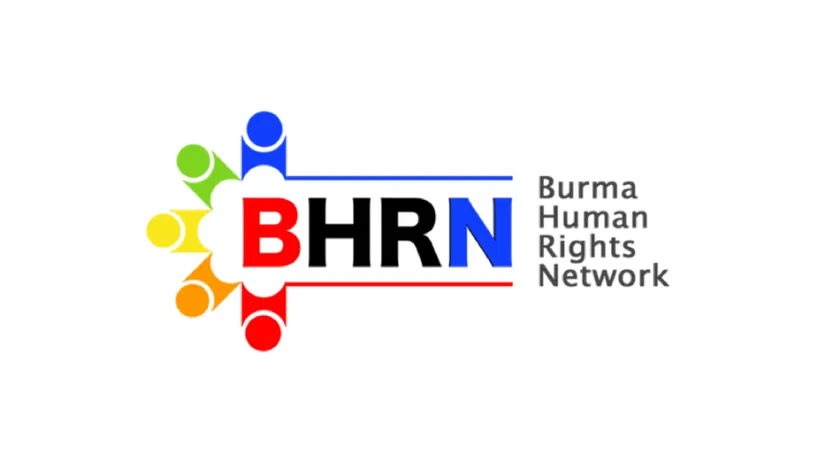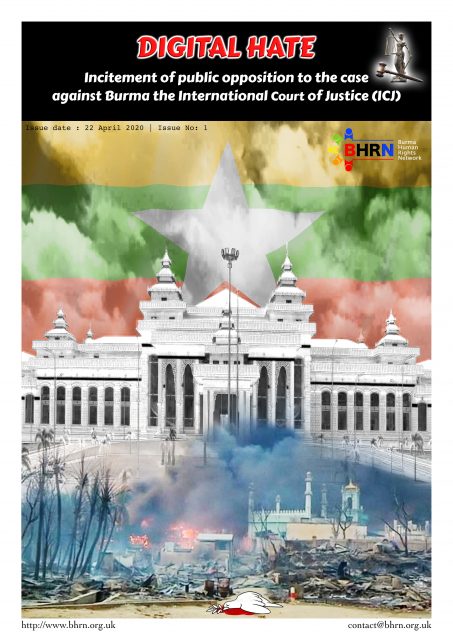Digital Hate: Incitement of Public Opposition to the Case Against Burma the International Court of Justice
22 April 2020


Acknowledgement:
Digital Hate is an ongoing series by Burma Human Rights Network that will regularly publish information regarding the spread of hate speech inside of Burma and the risks of escalating tensions and violence that could occur as a result. Issues will be released as relevant topics emerge, rather than monthly, to ensure that the information contained in the issue is pertinent and current.
BHRN has tried best the nearest translation of the original Facebook post from Burmese to English and apology in advance if there is any shortcoming.
Executive Summary:
- Following the case against Burma at the International Court of Justice a steady increase in anti-Muslim hate speech has been observed in the country.
- State Counsellor Aung San Suu Kyi’s own language has dismissed the legitimacy of the courts and UN missions while rallying the public against them.
- Individuals close to Aung San Suu Kyi and the National League for Democracy have posted comments on social media advocating the death of Rohingya and undermining the ICJ’s legitimacy.
- A former military officer and ally of the military aligned USDP party spread conspiracy theories about Rohingya as part of an Islamic invasion into Buddhist lands and demonised the Rohingya as unwanted even among Muslims. The same officer referred to the ICJ case as a “threat to rape the future of Myanmar”
- Several prominent Buddhist-nationalists continue to use social media to spread disinformation about the ICJ case and demonise Muslims.
- The grandson of former Burmese Dictator Ne Win has frequently used social media to demonise the Rohingya and undermine the legitimacy of the ICJ case, once writing, “The exiled Bengali activists should be prosecuted as they are the traitors who are liars and working for the cause of Bengali people.”
- Facebook continues to be slow or inactive in moderating posts containing hate speech by public figures and nationalist inside of Burma.
Methodology:
The information compiled in this report is based upon the monitoring of hundreds of social media accounts and thousands of posts. The information presented in this report highlights the most prominent figures among those posting hate speech on social media. The information compiled is from December of 2019 to February of 2020. The staff who compiled this information live inside of Burma and are native Burmese speakers. Any interviews conducted in relation to this report were done in Burmese by native Burmese speakers living inside of Burma.
Introduction
This first issue of Digital Hate focuses on hate speech around the International Court of Justice’s ruling to allow provisional measures against Burma to protect the ethnic Rohingya while the court investigates Burma for genocide against them. Burma was ordered to submit a review on 23rd May of measures they’ve taken to demonstrate to the court that they have complied with the ruling. Burma Human Rights Network has documented several of Burma’s failings to do so since the order was issued and it appears possible Burma will not submit any documents demonstrating compliance.
Since a lawsuit against Burma was submitted to the International Court of Justice (ICJ), there have been increased attacks against the case on several social media platforms, including Facebook and VK (A Russian based social media). Most of the comments in the social media posts about the issue suggest that the lawsuit was unjustly submitted to the ICJ through collusion between the court and the Organisation of Islamic Cooperation (OIC).
There have been several posts by pro-nationalists that appeared on Facebook and VK against the West African State of The Gambia which filed the lawsuit against Burma in the ICJ. The posts also criticised political activists and Civil Society Organisations (CSOs) which support the lawsuit, calling them traitors.
In an address to the nation on 18 December last year, the State Counsellor Daw Aung San Suu Kyi shared her experience of representing the country at the ICJ. She said the accusations made in the lawsuit by The Gambia were based on the report of the International Fact-finding Mission on Myanmar (FFM). She said Burma did not recognise the FFM from the time it was established by the United Nations Human Rights Council. She said, “If the people of Myanmar stand together with us it would be an invaluable strength for us”. This message amounts to advocating for public opposition to the case.
၎
င
၎
၎
Announcements
28 February 2025
Asian NGO Network on National Human Rights Institutions , CSO Working Group on Independent National Human Rights Institution (Burma/Myanmar)
Open letter: Removal of the membership of the dis-accredited Myanmar National Human Rights Commission from the Southeast Asia National Human Rights Institution Forum

Progressive Voice is a participatory rights-based policy research and advocacy organization rooted in civil society, that maintains strong networks and relationships with grassroots organizations and community-based organizations throughout Myanmar. It acts as a bridge to the international community and international policymakers by amplifying voices from the ground, and advocating for a rights-based policy narrative.